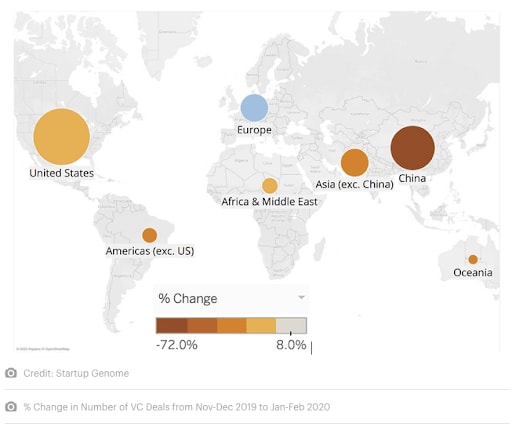This is what COVID-19 did to start-ups in China

The world can learn from China’s experience. Image: REUTERS/Thomas Peter

Get involved with our crowdsourced digital platform to deliver impact at scale
Stay up to date:
Innovation
- If global venture capital drops like China’s for just two months approximately $28 billion in startup investment will go missing in 2020.
- A 6-month drought in VC deals will wipe out a large portion of startups.
- Survivors of the crisis will emerge as potentially massive winners at the end.
As our world is shaken in the most dramatic way imaginable, it is time for our global startup community to get closer, support and learn from each other. Some of us remember the crash of 1987 and the dotcom bubble bursting in 2000, in addition to the 2007 financial crisis. Not only is its human impact horrible, but the current economic crisis is more sudden and could easily end up being worse – unless a couple of promising drugs that hospitals started administering this week end up being very effective.
In order for our startups to survive, it is important to understand what is happening elsewhere and the successive shockwaves hitting regions ahead of us; and to identify the public policy and private actions that are having a positive impact.
Let’s first look at ground zero of the crisis and learn from the Chinese experience as a baseline for what can happen in the rest of the world.
China’s industrial output already dropped 13.5% in January and February while retail sales decreased by 20.5% year-on-year. Because venture capitalists (VC) invest on medium and long-term potential, the impact was much more acute.
Chinese VC deals have contracted between 50 and 57 percentage points since the onset of the crisis. If a drop like that happens globally, even for just two months, approximately $28 billion in startup investment will go missing in 2020, with a dramatic impact on startups.

When we break down the numbers by region, we see that China saw the biggest drop in funding, followed by the rest of Asia. This is not surprising considering the importance of Chinese capital throughout Asia’s startup ecosystems.

This drop in VC deals is not seasonal and it is not due to the Chinese New Year. The previous three years show an equal or higher number of deals in January, compared with December.
Of course, the changes in numbers may not only be due to the COVID-19 pandemic. Data on startups is never perfect and what we present here is no exception: for example, funding rounds can take a while to show up in funding databases. To address that issue we focused on Series A and later rounds, which have shorter delays in reporting – unlike Seed rounds. The trends we report here are supported by our partners and friends on the ground.

If a drop similar to what we have seen in China happens globally, approximately $28 billion in startup investment will go missing in 2020, with a dramatic impact on startups. Many startups will be unable to raise a new round of funding. The first to run out of cash will be those who had started to fundraise in the last few months, nearing the end of their runway before the crash.
It is difficult to assess the proportion of startups that will fail, but with startups needing to raise money every 12 to 18 months with 3 to 6 months’ worth of cash at closing, a 6-month drought in VC deals could wipe out a large portion of startups – and worse if we consider the potentially fatal direct and indirect blow to one’s business model and operations (e.g. reduction in customer purchasing power, disappearing suppliers, etc).
What is the World Economic Forum doing about the coronavirus outbreak?
How ecosystems can act
Considering this scenario and the fact that startups have become the number one engine of job creation in our modern economies, it is imperative for governments and business leaders to learn what can be done from each other and act in a concerted fashion.
It is also important to remember that while startup failures will increase, such a crisis also radically opens up the competitive landscape to those who can weather the storm. For this reason and, as our friend Dane Stangler wrote, about half of Fortune 500 companies started during a recession or bear market.
You can subscribe to and contribute public and private policy solutions — and be among the first to get the COVID-19 and Startup Ecosystems Series — by signing up here.
Don't miss any update on this topic
Create a free account and access your personalized content collection with our latest publications and analyses.
License and Republishing
World Economic Forum articles may be republished in accordance with the Creative Commons Attribution-NonCommercial-NoDerivatives 4.0 International Public License, and in accordance with our Terms of Use.
The views expressed in this article are those of the author alone and not the World Economic Forum.
Related topics:
The Agenda Weekly
A weekly update of the most important issues driving the global agenda
You can unsubscribe at any time using the link in our emails. For more details, review our privacy policy.
More on Health and Healthcare SystemsSee all
Shyam Bishen
April 24, 2024
Shyam Bishen and Annika Green
April 22, 2024
Johnny Wood
April 17, 2024
Adrian Gore
April 15, 2024
Fatemeh Aminpour, Ilan Katz and Jennifer Skattebol
April 15, 2024






